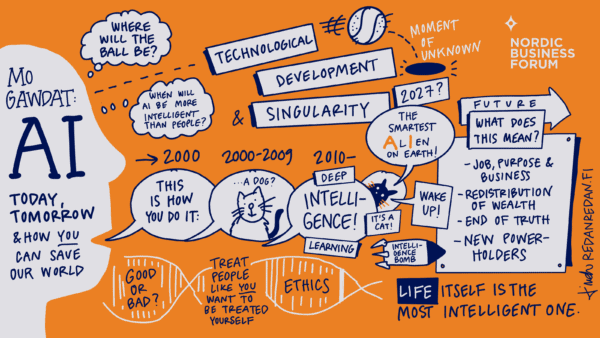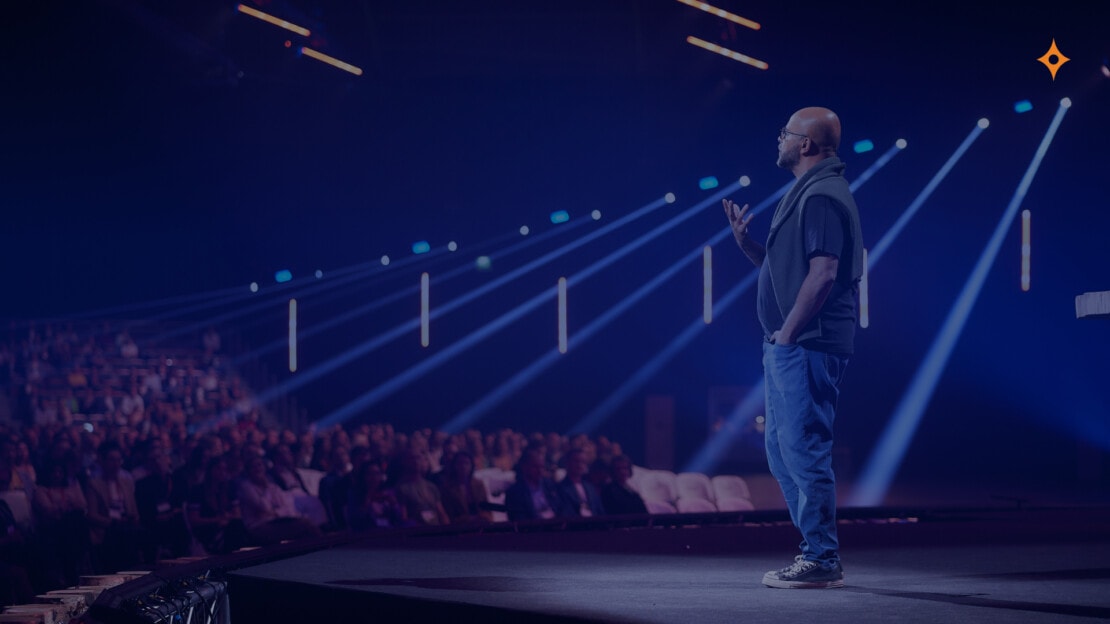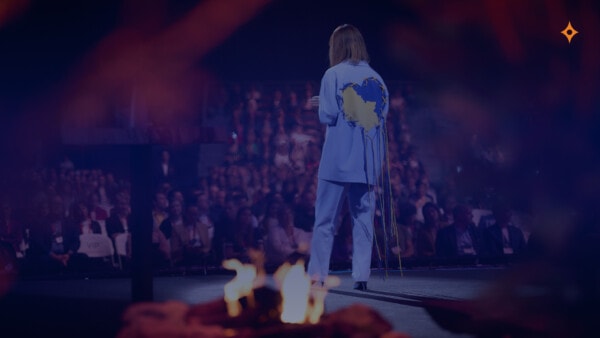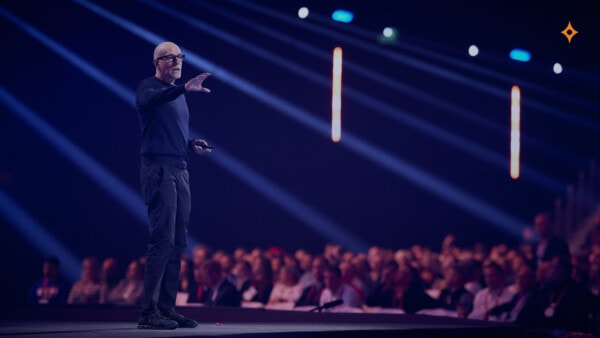5Oct2023
With so much confusion surrounding the impact of Artificial Intelligence in our age of post truth, we’re all in need of the guidance of a straight talking oracle. With that in mind, there are few people better qualified to disentangle the reality of AI from its various myths and misconceptions than IBM, Microsoft, and Google alumni Mo Gawdat.
By exploring the exponential, surprising development journey of today’s AI systems, and what they will mean for our future, Gawdat revealed why our actions today will shape our tomorrow and why the future of humanity is quite literally in our hands.
Why We Didn’t See This Coming
In the eyes of Mo, the developmental history of artificial intelligence is one of continuous, unexpectedly surpassed expectations. “We never expected AI to master Go, the most challenging strategy game on earth. We believed human ingenuity would let us remain the planet’s most creative force. We never thought a computer would surpass us at building and maintaining connections with other humans. Then an AI passed the Turing test.”
These mismatched expectations, according to Mo, derive from our belief that AI will follow the long-established path of technological advancement defined by Moore’s Law, and a misunderstanding of how an AI learns.
Since 1967, computing power has doubled, regular as clockwork, every 12-18 months. But today, “Chat GPT 3.5 currently boasts an IQ of 155, the same as Elon Musk. It has passed the Bar examination and has completed MBAs. By comparison, Chat GPT 4 boasts 10 X growth in performance. Imagine where we will be in 6 months’ time when Chat CPT 5 comes to market.”
These quantum leaps in advancement come down to how the algorithms that power today’s AIs are programmed. For a traditionally programmed computer to solve a problem, its programmer must solve it first, then provide an explicitly set of steps it must follow to achieve the same result. The bottleneck is the capability of the programmer.
For Deep Learning algorithms, task level human instruction is not needed. Instead, “you simply give it the outline of the task, and ask it to try.” In 2018, Reinforcement Learning also gave these programs the ability to change their own algorithm. “If the computer says an image is a duck, and we tell it “no, it’s a cat,” it can change the way it processes information so that it sees a cat from then on.” The bottleneck was removed.
Where Is the Ball Heading?
While AI seems to have burst, fully formed, onto the scene in the form of Chat GPT, Bard, and others, the reality is that what we see today is only the tip of the iceberg long in the making. “Chat GPT is the Netscape moment. Like AI, the internet had already existed for 2 decades before Netscape arrived. It was the browser that opened the door on the monster that was lurking out of sight.”
If what we see today is only a small fraction of what’s heading our way, Mo advised “not to focus on where the ball is. Instead, we should focus on where it’s heading.” For AI, that is the moment of singularity, an event horizon where the normal laws of physics no longer apply. The release of an Artificial General Intelligence that is smarter than humans in every way.
Estimates for the arrival of Artificial General Intelligence range from 2050 to the end of this decade. Mo offered a range of 2025-2027, because “something happens with the exponential nature of intelligence. When it reaches a certain point, it exceeds expectations as to its capabilities. And we’ve already seen so many surprises when it comes to what Artificial Intelligence is capable of doing.”
The precise date, according to Gawdat, doesn’t really make any difference. The important factor is that this alien intelligence will arrive on our planet, and we should already be making preparations for that moment.
Psst! Want to get the full summary of the Nordic Business Forum 2023 speeches + extra content for reflecting on your learning? Download your free copy of the full Executive Summary and summaries from previous events!
How Should We Prepare?
Despite media depictions of murderous robots sent to kill us, Mo was relatively certain that the arrival of AI is not likely to be the battle for survival we’re being told to prepare for. However, there are 4 major existential problems facing us that we aren’t giving the attention they deserve:
- The redefinition of jobs, business, and purpose. Businesses used to win because they hired the smartest people – in the next few months, the smartest person in a business will be a machine. What happens when your decision makers gets replaced by technology?
- The concentration of wealth and power. In our world of kings and peasants, farmers sow seed and prepare the harvest, and kings reap the rewards. Today, our prompts are the digital input seeds that automation kings like Google and Microsoft reap.
- The end of the truth. Most of the stream of information we consume online everyday is generated by AI. As an example, AI models have surpassed what surgery can achieve, and Instagram models make thousands of dollars through AI chatbots that flirt for a dollar a minute. How can we know what the truth is?
- The winner of the AI arms race will pull the pin. Whoever cracks the code of superintelligence will completely stop the rest of us from making any further advancements.
While these problems are startling, Mo asked the audience to reframe how we think about them, starting with the concept of intelligence. In his eyes, there’s nothing inherently wrong with intelligence, and an abundance of intelligence can solve climate change and prolong human lives. An abundance of intelligence also would mean the end of jobs, a century old invention ill suited to human psyches, which wouldn’t be such a bad thing. The problem actually resides in the human capacity for greed, in “a capitalist system that prioritises personal power and wealth.”
Ethics in the Age of AI
For the world, this is an Oppenheimer moment in Mo’s eyes. Harnessing the power of AI can be a positive or to the detriment of the human race, and right now is the time to get together and say “we can have enough abundance for everyone, can we please stop fighting.”
This conversation is the role of progressive governments like those in the Nordics, because larger governments like those in the US and China will only focus on the digital arms race, not the net benefit for humanity. We will not be able to regulate an entity that is ten times, or a billion times, smarter than us. Instead, Mo shared that the role of government should be to prepare humanity for the age of AI.
“We need to talk about a universal basic income if a lot of us start losing our jobs. We need to talk about the taxation structure for those that harness the power of AI. We need to start a conversation around the world that puts humanity on top of capitalism.”
Mo also spoke of our own personal burdens of responsibility when it comes to shaping the algorithms that will shape our future. “If you are a developer, investor, businessperson, or entrepreneur, I ask you one thing – do not use AI in a way that you would not want your children exposed to – this is the essence of ethics. Treat others as you would like to be treated.”
Abundance Over Scarcity
Mo Gawdat closed his keynote by stating that he “didn’t want to scare everyone too much, and we’ll most likely be fine anyway.” A moment will come in our eventual future where we hand over our decision making to a machine, and they will solve our global crisis in a microsecond by talking to the machines on the other side instead of killing millions of people.
“Between now and then, we need to prepare by doing two things: intensely embracing AI as a force for good, and vocally telling the world to engage and save our future. This is an interesting paradox. But isn’t that that the core of physics is all about?”

Visual summary of Mo Gawdat’s keynote by Linda Saukko-Rauta


